The global airflow balancer market is valued at USD 410 million in 2025. The airflow balancer market is slated to reach USD 613 million by 2035. This records an absolute increase of USD 203 million over the forecast period. The total growth amounts to 49.5%. The airflow balancer market forecast shows expansion at a compound annual growth rate (CAGR) of 4.1% between 2025 and 2035. The overall market size is expected to grow by approximately 1.49X during the same period. Growth is supported by increasing HVAC system efficiency demands. Growing commercial building construction drives expansion. Rising air quality control requirements support market development. Expanding industrial ventilation applications create opportunities.
The airflow balancer market represents a specialized segment of the global HVAC control systems industry. The airflow balancer market shows steady technological advancement. Consistent demand exists across building automation channels. HVAC optimization channels drive growth. Market dynamics are influenced by changing building requirements toward energy efficiency. Growing interest in air quality management shapes development. Expanding partnerships between HVAC manufacturers drive growth. Building operators in developed economies show increased adoption. Emerging economies demonstrate growing demand patterns. Traditional balancing methods continue evolving. Operators seek proven automation alternatives. Enhanced efficiency benefits attract building users. Reliable performance characteristics remain essential requirements.
Consumer behavior in the airflow balancer market reflects broader building automation trends. Efficient balancing systems provide functional benefits. Effective systems deliver energy savings. The airflow balancer market benefits from growing popularity of smart building solutions. These systems are recognized for sophisticated HVAC integration. Technical approach to airflow control gains acceptance. The versatility of airflow balancers supports multiple applications. Standalone balancing devices serve specific needs. Integrated HVAC system components expand market reach. Multiple building applications drive demand growth. Commercial segments show increased adoption patterns.
Regional adoption patterns vary significantly across global markets. North American markets show strong preference for standardized airflow balancer implementations. European markets demonstrate similar standardization trends. Asian markets show increasing adoption of advanced balancing solutions. Conventional balancing methods remain popular in developing regions. The building landscape continues evolving with sophisticated products. Quality-controlled airflow balancer products gain traction in mainstream applications. Building applications reflect operator willingness to invest in improvements. Proven balancing system enhancements attract investment. Performance-oriented features drive adoption decisions.
The competitive environment features established HVAC control companies. Specialized balancing solution providers focus on unique capabilities. Advanced control methods drive differentiation. Manufacturing efficiency remains critical for market participants. Product development optimization continues as key factor. Raw material costs create ongoing challenges. Quality standardization requirements fluctuate regularly. Distribution strategies emphasize multi-channel approaches. Traditional building supply chains combine with direct partnerships. Technical service platforms expand market reach. Supply distribution agreements strengthen customer relationships.
Market consolidation trends indicate acquisition strategies by larger manufacturers. HVAC control manufacturers acquire specialized balancing companies. Product portfolio diversification drives acquisition activity. Access to specialized balancing system segments motivates purchases. Private label development has gained momentum. Building companies seek differentiation opportunities. Competitive pricing structures remain important considerations. Specialized airflow balancer variants emerge in the airflow balancer market. Smart/IoT options reflect changing operator priorities. Automated options create new market opportunities. Innovative balancing system developers benefit from emerging trends. Manufacturing automation enables consistent production scaling. Quality control improvements maintain traditional performance characteristics. Operators expect established performance from balancing system brands.
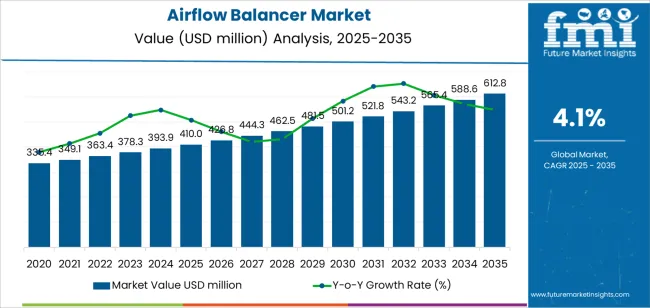
Between 2025 and 2030, the airflow balancer market projects expansion from USD 410 million to USD 511.5 million. This results in a value increase of USD 101.5 million. The increase represents 50% of the total forecast growth for the decade. This development phase will be shaped by increasing adoption of smart balancing technology. Rising demand for energy efficiency drives growth. Building automation solutions gain market acceptance. Growing emphasis on air quality supports expansion. Enhanced control characteristics attract users. Building operators expand HVAC capabilities. Growing demand for specialized airflow balancer implementations continues. Advanced automation options gain popularity. Building offerings across commercial segments increase.
| Metric | Value |
|---|---|
| Estimated Value (2025E) | USD 410 million |
| Forecast Value (2035F) | USD 613 million |
| Forecast CAGR (2025-2035) | 4.10% |
From 2030 to 2035, the airflow balancer market is forecast to grow from USD 511.5 million to USD 613 million. This adds another USD 101.5 million. The addition constitutes 50% of the overall ten-year expansion. This period is expected to be characterized by expansion of IoT-enabled systems. Integration of advanced automation solutions continues. Development of specialized airflow balancer implementations occurs. Enhanced efficiency profiles gain importance. Extended performance capabilities attract users. Growing adoption of fully automated building management will drive demand. Airflow balancers with superior control characteristics gains acceptance. Compatibility with smart building technologies across commercial operations expands.
Between 2020 and 2025, the airflow balancer market experienced steady development. Building efficiency demand drove market growth. Growing recognition of balancing systems as essential HVAC components supported expansion. Energy optimization programs across building applications gained momentum. Industrial applications showed growth. The airflow balancer market developed as operators recognized potential benefits. Airflow balancer solutions provide functional advantages. Energy efficiency benefits enable convenient building protocols. Technological advancement in control systems began development. Efficiency-critical applications emphasize importance of maintaining performance. Consistency in diverse building environments becomes critical.
Market expansion is supported by increasing demand for energy efficiency solutions. Building optimization requirements drive growth. HVAC performance management creates demand. Corresponding need for balancing solutions provides superior efficiency benefits. Control advantages enable enhanced operational outcomes. Extended compatibility across various commercial applications drives growth. Industrial applications show expansion. Modern operators focus on implementing proven balancing equipment. Efficiency specialists seek effective airflow support. Minimized energy complexity appeals to users. Consistent performance throughout complex building configurations attracts adoption. Diverse commercial environments require reliable solutions. Airflow balancers deliver exceptional balancing efficacy against traditional alternatives. Advanced HVAC integration capabilities support modern protocols. Essential components for contemporary building operations gain acceptance.
Growing emphasis on air quality drives demand for advanced balancing adoption. Airflow balancers support large-scale building requirements. Improved efficiency outcomes attract users. Advanced balancing systems gain acceptance. Operator preference for products combines effective airflow support with proven performance. Efficiency benefits create opportunities for innovative implementations. Rising influence of automation trends contributes to increased demand. Energy awareness drives market growth. Airflow balancers provide advanced reliability. Seamless HVAC integration appeals to users. Consistent performance across extended operation periods remains important.
The airflow balancer market shows potential for steady growth. Technological advancement continues development. Building operators across North America seek equipment delivering exceptional balancing quality. Europe shows similar trends. Asia-Pacific markets demonstrate growth potential. Emerging markets seek advanced efficiency capabilities. Reliable balancing options gain acceptance. Airflow balancer solutions gain prominence beyond traditional equipment. Strategic enablers of building automation expand applications. Advanced efficiency functionality grows in importance.
Rising building automation adoption in Asia-Pacific amplifies demand. Expanding energy efficiency initiatives globally support growth. Manufacturers leverage innovations in balancing engineering. Advanced HVAC integration gains momentum. Energy management technologies advance rapidly.
Pathways like high-performance implementations show promise for strong margin uplift. Specialized balancing platforms demonstrate potential. Advanced efficiency solutions target premium building segments. Geographic expansion captures volume opportunities. Product diversification addresses market needs. Local operator preferences become critical factors. Advanced automation adoption drives regional growth. Regulatory support around energy efficiency provides structural foundation. Balancing efficacy standards gain importance. Energy protocols strengthen market development.
The airflow balancer market is segmented by product type, system application, connection size, sales channel, and region. By product type, the market divides into Manual Balancing Valves, Automatic/Pressure-Independent, Electronic Airflow Balancers, and Smart/IoT Balancers categories. By system application, it covers HVAC (Commercial Buildings), Industrial Ventilation, Cleanrooms/Labs, and Residential segments. By connection size, it includes ≤DN100, DN101-DN200, and >DN200. By sales channel, it spans Project/EPC, Distributor, OEM/Skid Builder, and Online/Other. Regionally, the airflow balancer market covers North America, Europe, Asia-Pacific, Latin America, and Middle East & Africa.
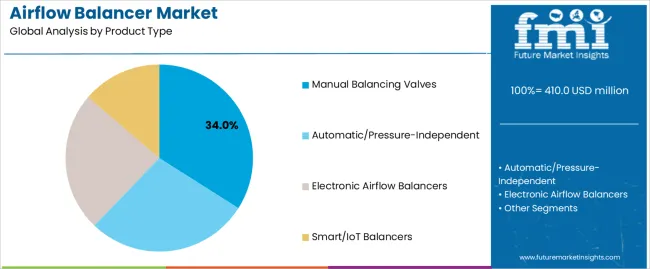
The manual balancing valves segment projects to account for 34% of the airflow balancer market in 2025. This reaffirms its position as the leading product type category. Building operators utilize manual implementations for superior cost standards. HVAC system integrators prefer these systems when operating across diverse building platforms. Excellent reliability properties attract users. Widespread acceptance ranges from basic balancing operations to critical HVAC processing. Manual valve technology's proven balancing methods address operator requirements for efficient balancing solutions. Complex building environments benefit from these capabilities.
This product type segment forms the foundation of modern building balancing adoption patterns. The implementation offers greatest cost effectiveness. Established market demand exists across multiple building categories. HVAC segments show strong adoption. Operator investments in manual valve standardization continue. Balancing efficiency improvements strengthen adoption among building operators. Commercial companies prioritize reliability with operational cost-effectiveness. Manual implementations align with functionality preferences. Performance expectations make these systems central components of comprehensive building balancing strategies.
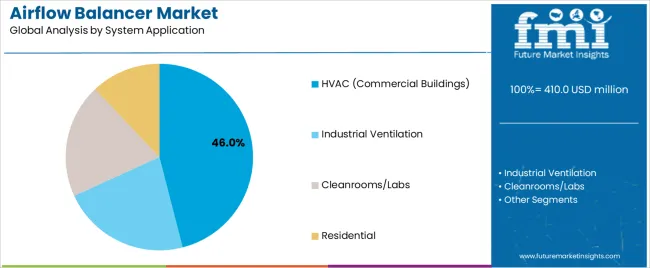
The HVAC (Commercial Buildings) applications project to represent 46% of airflow balancer demand in 2025. This underscores their critical role as primary deployment system for balancing devices. Commercial building operations use these systems across HVAC applications. Building operations benefit from balancing capabilities. Commercial building applications show strong adoption. Operators prefer this system type for exceptional versatility characteristics. Scalable balancing options appeal to users. Ability to handle diverse building demands while ensuring consistent balancing performance attracts adoption. Various building platforms benefit from balancing methods. Essential system type for modern commercial operations offers functional advantages. Efficiency benefits remain important considerations.
The segment gains support from continuous innovation in HVAC technologies. Growing availability of specialized implementations enables diverse building requirements. Enhanced balancing uniformity capabilities expand applications. Extended efficiency capabilities attract investment. Building operators invest in advanced balancing systems supporting large-scale commercial integration. Operational development drives growth. Building automation trends become prevalent. Operator efficiency awareness increases acceptance. Commercial HVAC applications continue representing major implementation markets. Advanced building utilization strategies gain support. Balancing integration initiatives expand market reach.
DN101-DN200 applications project to represent 38% of airflow balancer demand in 2025. This demonstrates significance as primary size range for balancing systems. Medium-scale operations benefit from versatility advantages. Building facilities show strong adoption. DN101-DN200 operators utilize balancing equipment for exceptional capacity characteristics. Proven reliability in diverse environments attracts users. Ability to maintain consistent balancing performance across various operational conditions appeals to operators. The segment's leadership reflects optimal balance of capacity and cost in building operations. Industry commitment to versatile sizing drives adoption.
The DN101-DN200 sector drives innovation in balancing technology through balanced capacity requirements. Moderate sizing regulations exist. Operators invest in advanced balancing systems ensuring operational versatility. Size compliance requirements grow. Increasing emphasis on building efficiency supports market position. Balanced sizing initiatives expand. DN101-DN200 applications maintain position as largest connection segment. Technological advancement initiatives continue. Performance optimization across airflow balancer markets gains momentum.
Project/EPC applications project to represent 44% of airflow balancer demand in 2025. This demonstrates significance as primary distribution approach for balancing systems. Construction operations benefit from project advantages. Building facilities show strong adoption. Project/EPC operators utilize balancing equipment for exceptional project characteristics. Proven reliability in construction environments attracts users. Ability to maintain consistent balancing performance across various project conditions appeals to operators. The segment's dominance reflects critical nature of project-based sales in construction operations. Industry commitment to project standards drives adoption.
The Project/EPC sector drives innovation in construction technology through demanding project requirements. Stringent project regulations exist. Operators invest heavily in advanced balancing systems ensuring project continuity. Project compliance requirements grow. Increasing emphasis on building efficiency supports market position. Project management initiatives expand. Project/EPC applications maintain position as largest sales segment. Project advancement initiatives continue. Performance optimization across airflow balancer markets gains momentum.
The airflow balancer market advances steadily due to increasing building energy efficiency requirements driven by sustainability standards. Cost reduction initiatives support growth. Growing adoption of balancing systems provides superior efficiency characteristics. Energy benefits enable enhanced building outcomes across diverse commercial applications. Industrial applications expand market reach. The airflow balancer market faces challenges including complex installation requirements compared to traditional alternatives. Specialized technical expertise creates implementation needs. Building operator training requirements grow. HVAC programs become more sophisticated. Innovation in smart balancing technology continues influencing product development. Automated solutions drive market expansion patterns.
Growing building automation sectors enable market development. Advanced energy management capabilities expand applications. Smart building awareness drives equipment manufacturers to produce advanced airflow balancer solutions. Superior efficiency positioning attracts users. Enhanced reliability profiles gain acceptance. Seamless integration functionalities expand market reach. Advanced balancing systems provide improved operational outcomes. More efficient building workflows develop. Reliable performance across various commercial applications continues. Operating conditions improve with advanced systems. Developers recognize competitive advantages of balancing solution integration capabilities. Market differentiation opportunities expand. Efficiency positioning becomes increasingly important.
Modern airflow balancer providers incorporate advanced IoT technology. Automation system integration expands capabilities. Sophisticated balancing solutions enhance product appeal. Intelligent control features develop rapidly. Value-added solutions for building customers gain acceptance. These technologies improve balancing efficiency. New market opportunities emerge including standardized performance. Optimized energy enhancement capabilities expand. Enhanced reliability characteristics attract users. Advanced automation integration allows developers supporting comprehensive building technologies. Market expansion beyond traditional balancing approaches continues.
Growing adoption of specialized applications enables market development. Advanced air quality management capabilities expand applications. Healthcare awareness drives equipment manufacturers to produce advanced airflow balancer solutions. Superior precision positioning attracts users. Enhanced contamination control profiles gain acceptance. Seamless integration functionalities expand market reach. Advanced cleanroom systems provide improved operational outcomes. More efficient laboratory workflows develop. Reliable performance across various controlled applications continues. Operating conditions improve with specialized systems. Developers recognize competitive advantages of specialized application integration capabilities. Market differentiation opportunities expand. Precision positioning becomes increasingly important.
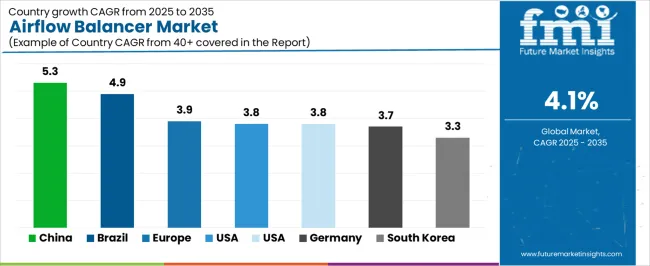
| Country | CAGR (2025-2035) |
|---|---|
| China | 5.3% |
| Brazil | 4.9% |
| Europe | 3.9% |
| United States (USA) | 3.8% |
| United Kingdom (UK) | 3.8% |
| Germany | 3.7% |
| South Korea | 3.3% |
| Japan | 2.6% |
The airflow balancer market experiences solid growth globally. China leads at 5.3% CAGR through 2035. Expanding building construction drives growth. Growing HVAC automation sector supports development. Significant investment in building technology continues. Brazil follows at 4.9%. Increasing commercial construction supports growth. Growing building modernization patterns develop. Expanding HVAC infrastructure drives demand. Europe shows growth at 3.9%. Engineering leadership emphasizes development. Balancing technology advancement continues. The United States records 3.8% growth. Expanding building capabilities support market development. HVAC automation modernization continues. The UK demonstrates 3.8% growth. Advanced balancing technology development occurs. Energy efficiency adoption trends drive market expansion. Germany exhibits 3.7% growth. Balancing technology innovation emphasizes development. Building advancement continues. South Korea shows 3.3% growth. Quality control initiatives support development. Japan records 2.6% growth supported by technology-focused production patterns.
The report covers in-depth analysis of 40+ countries, top-performing countries receive highlighting below.
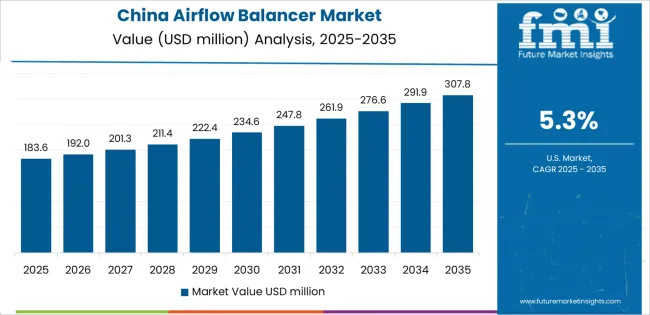
Revenue from airflow balancers in China projects exceptional growth with 5.3% CAGR through 2035. Expanding building construction capacity drives development. Rapidly growing HVAC automation sector receives government initiative support promoting advanced building development. The country's strong position in construction technology supports growth. Increasing investment in building infrastructure creates substantial demand for advanced implementations. Major construction companies establish comprehensive HVAC capabilities. Equipment system companies serve domestic building demand. Expanding urbanization markets drive growth.
China leads global market growth due to its massive construction boom and government emphasis on energy efficiency. The country benefits from rapid urbanization requiring efficient building systems. Major factors include large commercial construction requiring advanced HVAC balancing. Growing industrial development needing ventilation solutions. Strong government policies promoting energy-efficient buildings. Rising environmental awareness driving air quality control. Large healthcare sector requiring cleanroom applications. Advanced manufacturing facilities needing precise ventilation. Strong supply chain supporting equipment production. Rising focus on smart building capabilities.
Government support for building modernization initiatives drives demand for advanced balancing systems. Major construction regions benefit from development. Building centers across the country show expansion. Strong HVAC technology growth occurs. Expanding network of automation-focused builders supports rapid adoption. Construction operators seek advanced balancing capabilities. Integrated automation technologies gain acceptance.
Revenue from airflow balancers in Brazil expands at 4.9% CAGR. The country's growing construction sector supports development. Expanding building capacity drives growth. Increasing adoption of balancing technologies continues. Country initiatives promoting building modernization create demand. Growing balancing awareness drives requirements for quality-controlled HVAC systems. International construction providers establish extensive capabilities. Domestic building companies address growing demand for advanced balancing solutions.
Brazil shows strong growth potential driven by construction expansion and building modernization. The country experiences significant construction growth supported by economic development. Key factors include growing commercial building sector requiring HVAC balancing. Expanding industrial construction needing ventilation solutions. Rising healthcare sector requiring controlled environments. Government initiatives to modernize building capabilities. Growing adoption of international building standards. Strategic position for serving Latin American markets. Increasing focus on energy efficiency. Strong manufacturing sector requiring ventilation control.
Rising construction requirements create opportunities for airflow balancer adoption. Metropolitan construction centers show growth. Progressive builders invest in modern HVAC facilities. Major construction regions expand operations. Growing focus on construction integration drives adoption. Balancing features appeal to builders seeking enhanced operational capabilities. Advanced efficiency delivery experiences attract investment.
Revenue from airflow balancers in the United States expands at 3.8% CAGR. The country's advanced building technology sector supports development. Strategic focus on energy solutions continues. Established HVAC capabilities drive growth. The US balancing system innovation leadership supports market expansion. Building technology integration drives demand for specialized implementations in commercial applications. Industrial operations show growth. Advanced performance products expand market reach. Operators invest in comprehensive balancing development serving domestic specialty markets. International quality applications benefit from development.
The United States shows consistent growth driven by building innovation and energy efficiency culture. Strong commercial construction sector requiring advanced balancing solutions. Key factors include large healthcare industry needing cleanroom balancing equipment. Advanced manufacturing sector demanding quality HVAC systems. Government support for energy efficiency initiatives. Focus on building competitiveness through efficiency technology. Major defense industry requiring specialized ventilation equipment. Strong emphasis on automation and smart buildings. Major pharmaceutical sector needing precision balancing solutions. Growing focus on indoor air quality.
Building optimization and balancing technology advancement create opportunities for specialized balancing adoption in advanced systems. Commercial services benefit from development. Technology-focused building operations among leading enterprises gain acceptance. Growing emphasis on advanced balancing delivery drives adoption. Balancing features support quality implementations with enhanced technology profiles. Integrated balancing management throughout the country's building technology sector expands market reach.
Revenue from airflow balancers in the UK expands at 3.8% CAGR. The country's building engineering heritage supports development. Strategic focus on energy solutions continues. Established commercial capabilities drive growth. The UK's balancing system innovation leadership supports market expansion. Engineering technology integration drives demand for specialized implementations in building applications. Industrial operations show growth. Advanced quality products expand market reach. Operators invest in comprehensive balancing development serving domestic efficiency markets. International applications benefit from development.
The UK shows consistent growth driven by building engineering heritage and energy efficiency focus. Strong commercial sector requiring precision balancing solutions. Key factors include advanced building programs requiring high-efficiency balancing. Growing construction sector needing specialized balancing capabilities. Strong emphasis on building excellence driving efficiency requirements. Focus on high-value construction through energy technology. Advanced pharmaceutical industry requiring precision balancing. Strong position in commercial building. Growing emphasis on building innovation. Strong technical education supporting skilled operators.
Engineering optimization and efficiency technology advancement create opportunities for specialized balancing adoption in advanced systems. Building services benefit from development. Technology-focused engineering operations among leading enterprises gain acceptance. Growing emphasis on advanced balancing delivery drives adoption. Balancing features support quality implementations with enhanced technology profiles. Integrated efficiency management throughout the country's building technology sector expands market reach.
Revenue from airflow balancers in Germany expands at 3.7% CAGR. The country's engineering heritage supports development. Strong emphasis on balancing technology continues. Robust demand for advanced balancing systems exists in building applications. Commercial applications drive growth. The nation's mature construction sector supports development. Technology-focused operations drive sophisticated implementations throughout the balancing industry. Leading manufacturers invest extensively in technology development. Advanced balancing methods serve domestic markets. International markets benefit from German expertise.
Germany maintains its position as Europe's building engineering leader with Industry 4.0 initiatives driving automation adoption. The country's advanced construction culture supports intelligent balancing systems. Growth drivers include world-class commercial construction requiring precision balancing solutions. Advanced HVAC manufacturing sector demanding quality balancing equipment. Strong industrial sector needing specialized balancing systems. Excellent engineering education producing precision construction expertise. High quality standards encouraging sophisticated equipment. Advanced building processes requiring extreme efficiency. Well-developed industrial infrastructure supporting precision equipment. Strong tradition of engineering excellence in construction.
Rising demand for high-performance efficiency technologies creates requirements for sophisticated solutions. Exceptional balancing capabilities appeal to quality-conscious builders. Enhanced construction experiences gain acceptance. Advanced balancing methods attract investment. Strong engineering tradition supports growth. Growing investment in efficiency technologies drives adoption. Quality platforms with advanced development methods appeal to users. Enhanced efficiency profiles across construction operations expand in major building regions.
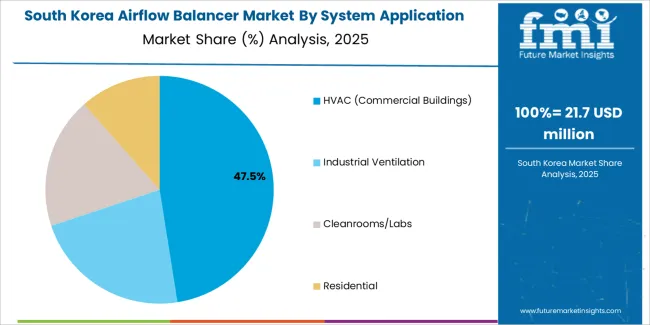
Revenue from airflow balancers in South Korea grows at 3.3% CAGR. The country's technology integration initiatives drive development. Expanding construction sector supports growth. Strategic focus on balancing development continues. South Korea's advanced building capabilities support market expansion. Commitment to construction modernization drives investment in specialized technologies. Major building regions benefit from development. Industry leaders establish comprehensive technology integration systems. Domestic construction operations benefit from advanced balancing applications.
South Korea exhibits growth driven by advanced construction culture and technology development. Key drivers include major construction companies requiring precision balancing solutions. Strong semiconductor industry needing specialized cleanroom balancing equipment. Government support for advanced building technologies. Growing focus on energy efficiency in construction sector. High technology adoption culture in building applications. Rising emphasis on air quality control in buildings. Advanced manufacturing automation capabilities. Strong emphasis on export competitiveness through building technology. Growing commercial construction sector requiring precision balancing.
Innovations in balancing platforms create demand for advanced implementations. Technology integration capabilities attract users. Exceptional efficiency properties appeal to progressive builders. Enhanced technology differentiation gains acceptance. Operational appeal drives adoption. Growing construction adoption supports market development. Increasing focus on balancing innovation drives advanced platform adoption. Integrated balancing delivery gains acceptance. Building optimization across construction enterprises throughout the country expands market reach.
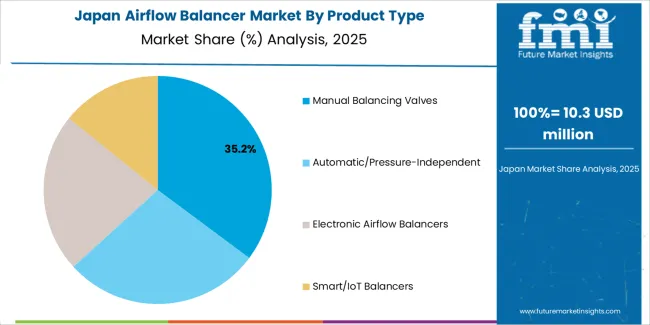
Revenue from airflow balancers in Japan expands at 2.6% CAGR. The country's balancing system excellence initiatives support development. Growing efficiency technology sector continues expansion. Strategic emphasis on advanced building development drives market growth. Japan's advanced quality control capabilities support demand. Integrated balancing systems drive demand for high-quality platforms in building operations. Commercial applications grow. Advanced technology applications expand market reach. Leading manufacturers invest in specialized capabilities. Technology-focused building requirements gain attention. Efficiency industries demand sophisticated solutions.
Japan shows steady growth supported by quality-focused building culture and advanced technology development. Growth factors include highly sophisticated construction industry with precision requirements. Strong emphasis on quality control and continuous improvement (kaizen). Advanced building processes requiring extreme efficiency. Strong HVAC technology manufacturing capabilities producing balancing equipment. Focus on energy efficiency for competitive advantage. High technology adoption in building processes. Strong materials science and precision engineering capabilities. Advanced automation in construction requiring precision balancing. Growing focus on sustainable buildings through efficiency technology.
Quality control advancement creates requirements for specialized solutions. Superior quality integration appeals to users. Exceptional efficiency capabilities attract investment. Advanced performance features gain acceptance among quality-conscious construction operations. Building operators seek sophisticated systems. Strong position in efficiency technology innovation supports adoption. Advanced systems with validated balancing characteristics gain acceptance. Quality integration capabilities throughout the country's building technology sector expand.
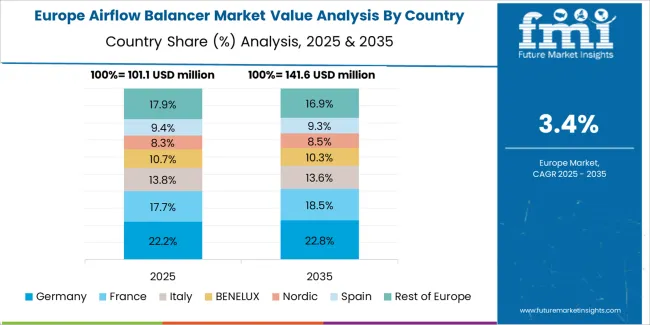
The airflow balancer market in Europe projects growth from USD 123 million in 2025 to USD 184 million by 2035. This registers CAGR of 3.9% over the forecast period. Germany expects to maintain leadership position with 31.7% market share in 2025. This declines slightly to 31.4% by 2035. Support comes from strong engineering culture. Sophisticated balancing manufacturing capabilities continue. Comprehensive building sector serves diverse applications across Europe.
United Kingdom follows with 25.2% share in 2025. This projects to reach 25.4% by 2035. Robust demand for advanced balancing technologies in building applications drives growth. Energy modernization programs support development. Balancing markets benefit from established building infrastructure. Technology integration expertise continues. France holds 19.5% share in 2025. This expects to reach 19.7% by 2035. Strong efficiency technology sector supports growth. Growing construction activities drive development. Italy commands 12.6% share in 2025. This projects to reach 12.7% by 2035. Spain accounts for 8.1% in 2025. This expects to reach 8.2% by 2035. Rest of Europe region anticipates maintaining momentum. Collective share moves from 2.9% to 2.6% by 2035. Increasing balancing modernization in Eastern Europe drives development. Growing technology penetration in Nordic countries implementing advanced building programs supports expansion.
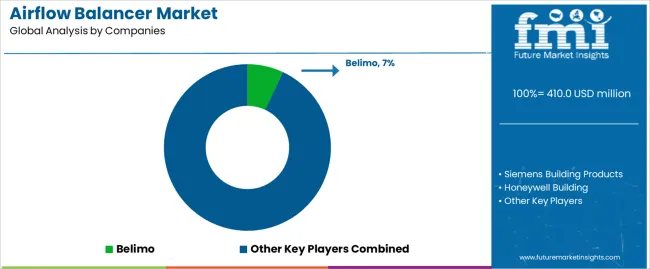
The airflow balancer market demonstrates moderate competition among established HVAC control manufacturers, specialized building automation providers, and integrated construction solution companies. Companies invest significantly in smart balancing technology development, IoT integration, precision engineering advancement, and comprehensive service capabilities to deliver reliable, efficient, and cost-effective airflow balancer solutions. Innovation in pressure-independent systems, digital controls, advanced sensor integration, and building connectivity remains central to strengthening market position and competitive advantage across global markets.
Belimo leads the airflow balancer market with a 7% market share, offering comprehensive airflow balancer solutions including quality control platforms and advanced automation systems with particular focus on commercial and industrial applications. The company's strength lies in HVAC control innovation, providing integrated solutions that combine traditional balancing expertise with modern automation technology. Siemens Building Products provides specialized building automation capabilities with strong emphasis on advanced airflow balancer implementations and innovative control solutions, particularly serving commercial and institutional markets. Honeywell Building delivers comprehensive HVAC services with focus on integrated platforms and large-scale building applications, combining balancing technology with complete building management solutions.
Johnson Controls specializes in building automation and precision balancing implementations for commercial environments, expanding market reach through comprehensive building solutions. Danfoss focuses on premium control integration and innovative technology solutions for HVAC markets. Griswold Controls offers advanced balancing platforms with emphasis on cost-effective and reliable applications, serving both commercial and industrial sectors. The competitive environment also includes significant players like Tour & Andersson (IMI), Nailor Industries, Ruskin, and Spirotech, each focusing on specific market segments and technological specializations in HVAC control and air management equipment.
The competitive landscape reflects ongoing technological advancement as companies develop more sophisticated IoT-enabled systems, automated control capabilities, and integrated building management systems. Companies focus on developing comprehensive solutions that combine airflow balancer technology with digital building platforms, predictive maintenance capabilities, and advanced energy management technologies to differentiate offerings and capture higher-value market segments. Strategic partnerships between equipment manufacturers and building operators drive innovation and market expansion, while increasing emphasis on energy efficiency and sustainability creates opportunities for companies to develop more efficient balancing solutions that integrate with smart building ecosystems.
| Item | Value |
|---|---|
| Quantitative Units | USD 410 million |
| Product Type | Manual Balancing Valves; Automatic/Pressure-Independent; Electronic Airflow Balancers; Smart/IoT Balancers |
| System Application | HVAC (Commercial Buildings); Industrial Ventilation; Cleanrooms/Labs; Residential |
| Connection Size | ≤DN100; DN101-DN200; >DN200 |
| Sales Channel | Project/EPC; Distributor; OEM/Skid Builder; Online/Other |
| Regions Covered | North America; Europe; Asia-Pacific; Latin America; Middle East & Africa |
| Countries Covered | United States; China; Germany; United Kingdom; Japan; South Korea; Brazil; and 40+ additional countries |
| Key Companies Profiled | Belimo; Siemens Building Products; Honeywell Building; Johnson Controls; Danfoss; Griswold Controls |
| Additional Attributes | Dollar sales by product type and system application category; regional demand trends; competitive landscape; technological advancements in building automation; IoT development; efficiency innovation; HVAC integration protocols |
The global airflow balancer market is estimated to be valued at USD 410.0 million in 2025.
The market size for the airflow balancer market is projected to reach USD 612.8 million by 2035.
The airflow balancer market is expected to grow at a 4.1% CAGR between 2025 and 2035.
The key product types in airflow balancer market are manual balancing valves, automatic/pressure-independent, electronic airflow balancers and smart/iot balancers.
In terms of system application, hvac (commercial buildings) segment to command 46.0% share in the airflow balancer market in 2025.






Full Research Suite comprises of:
Market outlook & trends analysis
Interviews & case studies
Strategic recommendations
Vendor profiles & capabilities analysis
5-year forecasts
8 regions and 60+ country-level data splits
Market segment data splits
12 months of continuous data updates
DELIVERED AS:
PDF EXCEL ONLINE
Laminar Airflow Cabinet Market Size and Share Forecast Outlook 2025 to 2035
Cloud Load Balancers Market Analysis by Component, Vertical, and Region Through 2025 to 2035

Thank you!
You will receive an email from our Business Development Manager. Please be sure to check your SPAM/JUNK folder too.
Chat With
MaRIA